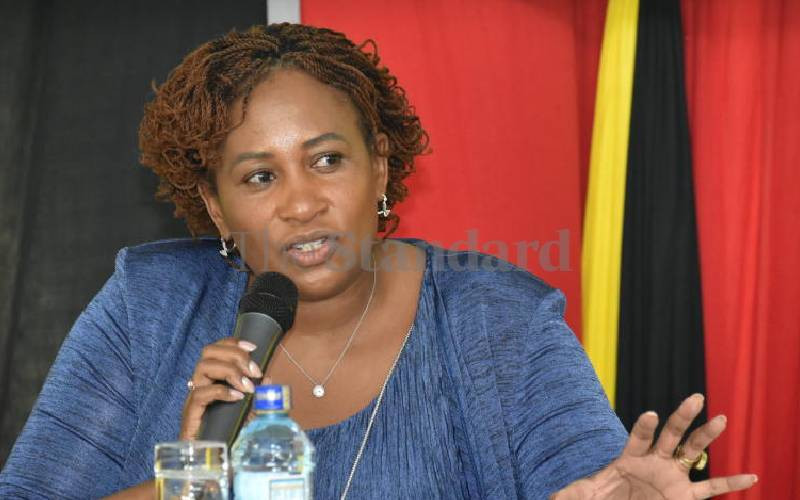The modernisation and revitalisation of the National Youth Service (NYS) in 2014 saw the transformation of a body that has served as a cornerstone for youth empowerment for many years.
Unlike the old NYS, which was started to confront post-independence challenges, the vision of the new Service is to adapt to the changing times and address modern challenges facing the youth.
The changes are part of an ambitious plan rolled out by the Devolution and Planning Ministry, as part of efforts to reduce unemployment.
Following the re-branding, NYS can accommodate more recruits than the traditional 4,000.
In a year, 21,870 young people aged between 18 and 22 will be recruited into the NYS, and in turn they will be expected to mentor 227,670 young people annually. Afterwards, the 227,670 will be organised in groups of 15 youths per squad with a total of 323 squads per county.
In November, NYS recruited the first batch of 10,935 youth from across the country.
The NYS was established in 1964 by an Act of Parliament (Cap 208 of the Laws of Kenya) to train young people in tasks of national importance, including service in the armed forces, national reconstruction programmes and disaster response.
Soon after ascending to power in 2003, in an attempt to rehabilitate street children, the Narc government had them rounded up and taken for training in artisan skills at NYS.
Free WIFI
However, the project soon collapsed. There were no openings for those who successfully completed the NYS training and many of them returned to the streets after leaving the NYS camps. The collapse of the project caused the NYS to lose its glory and status in the eyes of Kenyans.
However, in 2014, the sleeping giant was woken up under the stewardship of Devolution and Planning Cabinet Secretary Anne Waiguru and NYS Director General Nelson Githinji. During its 50th anniversary on September 10, the NYS was re-launched in Gilgil as 4,000 recruits graduated.
Re-branding entailed a new logo, new website, creation of official social media pages, YouTube advertisement, as well as billboard and newspaper advertising. The logo was changed to a more youthful and modern one that shows the direction the NYS intends to take in future while clearly showing its Kenyan roots.
The uniform has also been changed to one deemed more appealing to the people wearing it; the youth.
For its efforts, NYS won the title of the best re-branding campaign from the Marketing Society of Kenya.
The new Youth Service is guided by a strategic plan aimed at ensuring the trainees’ talents do not go to waste after training. As part of the restructuring plan, NYS will conduct basic and vocational training covering engineering, agribusiness, construction, hospitality, fashion, enterprise and public duty.
Stay informed. Subscribe to our newsletter
In addition, the Service will focus on building and supporting self-employment promotion units to encourage entrepreneurship.
The radical changes in the NYS are aimed at ensuring the youth play a key role in Kenya’s development. Nearly 2,500 NYS graduates will soon relieve the police of some roles, thus leaving the overstretched National Police Service to concentrate on its core duties of fighting crime. This is expected to reduce the police to population ratio to 1:400 from the current 1:850.
NYS will be engaged in traffic control in Nairobi from February next year. It also intends to establish a private security firm to employ its graduates. Some NYS recruits have already been spotted around shopping malls offering security.
Also in the works is an ambitious plan to transform slums through initiatives such as the Kibera upgrading programme launched in September. In coordination with local youth volunteers, the NYS has undertaken cleanup of bridges and sewers, alongside construction of toilets, trenches and houses, giving Kibera slum a much-needed facelift.
By the end of the programme, there will be free Wi-Fi in Kibera, shops for youth to conduct business in, and posho mills selling flour at a subsidised Sh60 for 2kg.
Other initiatives include a street lighting project, construction of police posts in every village in Kibera, road tarmacking, a maternal health clinic, several ablution blocks, urban agriculture kits and jobs for 3,000 youths. The project was to last three months but President Uhuru Kenyatta extended it for another six months.
The NYS will also be involved in six other programmes; agriculture, dam and road construction, vector control, slum civil works, Huduma kitchens, and public security and traffic control.
 The Standard Group Plc is a
multi-media organization with investments in media platforms spanning newspaper
print operations, television, radio broadcasting, digital and online services. The
Standard Group is recognized as a leading multi-media house in Kenya with a key
influence in matters of national and international interest.
The Standard Group Plc is a
multi-media organization with investments in media platforms spanning newspaper
print operations, television, radio broadcasting, digital and online services. The
Standard Group is recognized as a leading multi-media house in Kenya with a key
influence in matters of national and international interest.
 The Standard Group Plc is a
multi-media organization with investments in media platforms spanning newspaper
print operations, television, radio broadcasting, digital and online services. The
Standard Group is recognized as a leading multi-media house in Kenya with a key
influence in matters of national and international interest.
The Standard Group Plc is a
multi-media organization with investments in media platforms spanning newspaper
print operations, television, radio broadcasting, digital and online services. The
Standard Group is recognized as a leading multi-media house in Kenya with a key
influence in matters of national and international interest.








